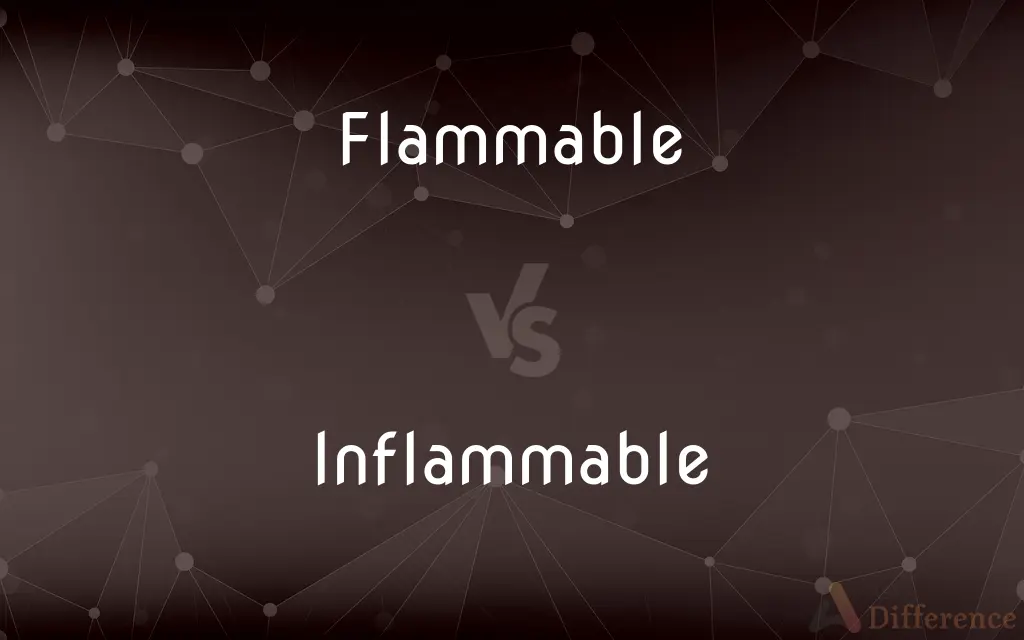Flammable vs. Inflammable — What's the Difference?
Edited by Tayyaba Rehman — By Fiza Rafique — Updated on November 1, 2023
Flammable and inflammable both describe materials that can easily catch fire; however, "inflammable" can sometimes confuse as it sounds like "not flammable."

Difference Between Flammable and Inflammable
Table of Contents
ADVERTISEMENT
Key Differences
Flammable objects or substances are easily ignited and capable of burning quickly. Inflammable, a less common term, also indicates a propensity to burn, but its prefix can misleadingly suggest non-flammability.
In safety contexts, 'flammable' is preferred to avoid confusion, since 'inflammable' might incorrectly be taken to mean 'not flammable'. Both words, however, originate from the Latin "flammare", meaning "to flame".
Flammable materials are labeled as such to indicate fire risk. Inflammable materials, while technically the same in terms of fire risk, are now less commonly labeled with this term, again to prevent misunderstanding.
The switch to using 'flammable' in warnings was made to ensure clarity, because the 'in-' prefix in 'inflammable' can denote negation in English, though in this case, it intensifies the verb. The similarity in meaning persists, but 'flammable' is clearer in intent.
Comparison Chart
Definition
Easily ignited and capable of burning
Also easily ignited and capable of burning
ADVERTISEMENT
Common Usage
Widely used to denote fire risk
Less used due to potential confusion
Safety Labels
Often labeled as "Flammable"
Rarely labeled as "Inflammable" nowadays
Prefix
Straightforward, no prefix
Contains "in-" which can be confusing
Communication Clarity
Clear and direct
Potentially misleading
Compare with Definitions
Flammable
Capable of catching fire easily.
Keep the flammable liquids away from the campfire.
Inflammable
Quick to catch fire.
Inflammable substances are prohibited in checked baggage.
Flammable
Able to burn rapidly.
She stored the flammable chemicals in a safe cabinet.
Inflammable
Capable of burning quickly.
The warehouse stores several inflammable products.
Flammable
Quick to ignite.
Flammable gases like hydrogen need careful handling.
Inflammable
Able to ignite easily.
They used inflammable materials for the fire drill.
Flammable
Easily set on fire
The use of highly flammable materials
Inflammable
Susceptible to fire.
The inflammable nature of the solvent necessitates careful use.
Flammable
Easily ignited and capable of burning rapidly.
Inflammable
Easily combustible.
The sign warned that the contents of the container were inflammable.
Flammable
Capable of burning, especially a liquid.
Inflammable
Easily set on fire
Inflammable materials
Flammable
Easily set on fire.
Inflammable
A substance which is easily set on fire.
Flammable
Subject to easy ignition and rapid flaming combustion.
Inflammable
Easily ignited and capable of burning rapidly; flammable. See Usage Note at flammable.
Flammable
Any flammable substance.
Inflammable
Quickly or easily aroused to strong emotion; excitable.
Flammable
Inflammable.
Inflammable
Capable of burning; easily set on fire.
Flammable
Possible to burn
Inflammable
(figuratively) Easily excited; set off by the slightest excuse; easily enraged or inflamed.
Flammable
Susceptible to combustion.
Flammable materials must be stored in a cool, dry place.
Inflammable
(nonstandard) Incapable of burning; not easily set on fire.
Inflammable
Any inflammable substance.
Inflammable
Capable of being easily set fire; easily enkindled; combustible; as, inflammable oils or spirits.
Inflammable
Excitable; irritable; irascible; easily provoked; as, an inflammable temper.
Inflammable
Possible to burn
Common Curiosities
Why do some labels say inflammable?
Inflammable is an older term that is still used, but it is being replaced by flammable to avoid confusion.
What does inflammable mean?
Inflammable also means capable of catching fire easily and burning quickly.
Should I avoid using inflammable to prevent confusion?
Yes, it's advisable to use flammable when labeling substances to prevent misunderstanding.
Can a substance be neither flammable nor inflammable?
Yes, substances like water and asbestos do not easily catch fire and are considered non-flammable.
What should you do if you encounter a flammable liquid?
Keep it away from heat sources and handle it with care.
What's a common example of a flammable material?
Gasoline is a common example of a flammable material.
Is water flammable or inflammable?
No, water is neither flammable nor inflammable.
What does flammable mean?
Flammable means capable of catching fire easily and burning quickly.
Are flammable and inflammable synonyms?
Yes, they both describe substances that can ignite and burn easily.
Do 'flammable' and 'inflammable' come from the same root word?
Yes, both come from the Latin word "flammare".
Are all gases flammable?
No, not all gases are flammable; some are non-flammable or inert.
What does 'highly flammable' mean?
It means that the substance can catch fire very easily and rapidly.
Can flammable items be transported by air?
Flammable items are subject to strict regulations when transported by air.
Is 'inflammable' a technical term?
It can be used technically, but 'flammable' is preferred in most contexts for clarity.
Are safety precautions the same for flammable and inflammable goods?
Yes, safety precautions should be the same as both can catch fire easily.
Share Your Discovery

Previous Comparison
Themselves vs. Theirself
Next Comparison
Catapult vs. SlingshotAuthor Spotlight
Written by
Fiza RafiqueFiza Rafique is a skilled content writer at AskDifference.com, where she meticulously refines and enhances written pieces. Drawing from her vast editorial expertise, Fiza ensures clarity, accuracy, and precision in every article. Passionate about language, she continually seeks to elevate the quality of content for readers worldwide.
Edited by
Tayyaba RehmanTayyaba Rehman is a distinguished writer, currently serving as a primary contributor to askdifference.com. As a researcher in semantics and etymology, Tayyaba's passion for the complexity of languages and their distinctions has found a perfect home on the platform. Tayyaba delves into the intricacies of language, distinguishing between commonly confused words and phrases, thereby providing clarity for readers worldwide.
















































